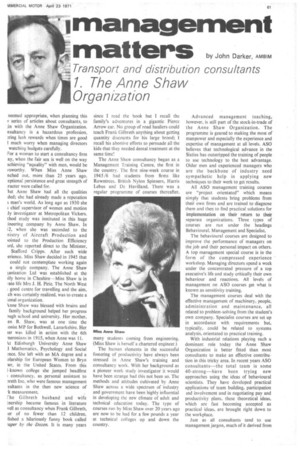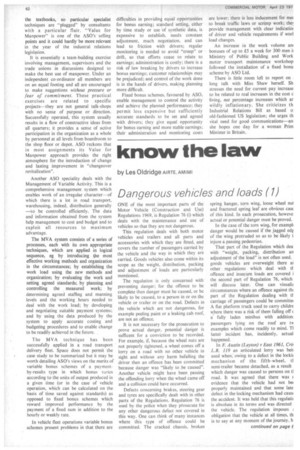management
Page 63

Page 64

If you've noticed an error in this article please click here to report it so we can fix it.
matters by John Darker, AMBIM
Transport and distribution consultants
I?. The Anne Shaw
Organization
seemed appropriate, when planning this v series of articles about consultants, to ;in with the Anne Shaw Organization. nsultancy is a hazardous profession, 3ring lush rewards when times are good I much worry when managing directors watching budgets carefully.
For a woman to start a consultancy firm ay, when the fair sex is well on the way achieving "equality" with men, would be vsworthy. When Miss Anne Shaw ached out, more than 25 years ago, eptional persistence and great strength of iracter were called for.
3ut Anne Shaw had all the qualities ded; she had already made a reputation t man's world. As long ago as 1930 she 3 chief supervisor of women and motion dy investigator at Metropolitan Vickers. thod study was instituted in this huge ineering company by Anne Shaw. In
when she was seconded to the nistry of Aircraft Production and )ointed to the Production Efficiency ird, she reported direct to the Minister,
Stafford Cripps. After such wide ,erience, Miss Shaw decided in 1945 that
could not contemplate working again a single company. The Anne Shaw ;anization Ltd was established at the lily home in Cheshire—Miss Shaw is in Tate life Mrs J. H. Pine. The North West good centre for travelling and the aim, ch was certainly realized, was to create a ional organization.
knne Shaw was blessed with brains and family background helped her progress )ugh school and university. Her mother, en B. Shaw, was at one time the ionist MP for Bothwell, Lanarkshire. Her ler was killed in action with the 6th neronians in 1915, when Anne was 11.
Edinburgh University Anne Shaw i Mathematics, Psychology and Social .!.nce. She left with an MA degree and a olarship for European Women to Bryn wr, in the United States. From this l-known college she jumped headfirst
consultancy, as personal assistant to )reth Inc, who were famous management sultants in the then new science of .1( measurement.
fhe Gilbreth husband and wife tnership became famous in literature veil as consultancy when Frank Gilbreth, [er of no fewer than 12 children, fished a hilariously funny book called uxper by the -Dozen. It is many years
since I read the book but I recall the family's adventures in a gigantic Pierce Arrow car. No group of road hauliers could teach Frank Gilbreth anything about getting quantity discounts for his large brood; I recall his abortive efforts to persuade all the kids that they needed dental treatment at the same timer The Anne Shaw consultancy began as a Management Training Centre, the first in the country. The first nine-week course in 1945/6 had students from firms like Rowntrecs. British Nylon Spinners, Harris Lebus and De Havilland. There was a regular programme of courses thereafter, many students coming from engineering. (Miss Shaw is herself a chartered engineer.) The human elements in the successful fostering of productivity have always been stressed in Anne Shaw's training and consultancy work. With her background as a pioneer work study investigator it would have been strange had this not been so. The methods and attitudes cultivated by Anne Shaw across a wide spectrum of industry and government have been highly influential in developing the new climate of adult and technical education today. The type of courses run by Miss Shaw over 20 years ago are now to be had for a few pounds a year at technical colleges up and down the country. Advanced management teaching, however, is still part of the stock-in-trade of the Anne Shaw Organization. The programme is geared to making the most of manpower and especially the experience and expertise of management at all levels. ASO believes that technological advance in the Sixties has outstripped the training of people to use technology to the best advantage. Older men and experienced managers who are the backbone of industry need sympathetic help in applying new techniques to their work to get results.
All ASO management training courses are "project orientated" which means simply that students bring problems from theif own firms and are trained to diagnose them and thee to find practical solutions for implementation on their return to their separate organizations. Three types of courses are run under the headings Behavioural. Management and Specialist.
The behavioural courses are designed to improve the performance of managers on the job and their personal impact on others. A top management special course is in the form of the compressed experience workshop. Managing directors spend a week under the concentrated pressure of a top executive's life and study critically their own behaviour and reactions. All levels of management on ASO courses get what is known as sensitivity training.
The management courses deal with the effective management of machinery, people, administration and maintenance, all related to problem-solving from the student's own company. Specialist courses are set up in accordance with requirements but, typically, could be related to systems analysis, orientated to practical training.
With industrial relations playing such a dominant role today the Anne Shaw Organization is better fitted than most consultants to make an effective contribution in this tricky area. In recent years ASO consultants--the total team is some 40-strong--have been trying new approaches using the ideas of behavioural scientists. They have developed practical applications of team building, participation Ind involvement and in negotiating pay and productivity plans, these theoretical ideas, which are fast becoming accepted as practical ideas, are brought right down to the workplace.
Just as all consultants tend to use management jargon, much of it derived from the textbooks, so particular specialist techniques are "plugged" by consultants with a particular flair. "Value for Manpower" is one of the ASO's • selling points and it could hardly be more relevant in the year of the industral relations legislation.
It is essentially a team-building exercise involving management, supervisors and the trade unions in discussions designed to make the best use of manpower. Under an independent co-ordinator all members are on an equal footing and all are encouraged to make suggestions without pressure or fear of commitment. These practical exercises are related to specific projects—they are not general talk-shops with no sense of purpose or direction. Successfully operated, this system usually results in a flow of constructive ideas from all quarters; it provides a sense of active participation in the organization as a whole by personnel at all levels from boardroom to the shop floor or depot. ASO reckons that in most assignments its Value for Manpower approach provides the right atmosphere for the introduction of change and lasting improvement in "changeover revitalization".
Another ASO speciality deals with the Management of Variable Activity. This is a comprehensive management system which enables work of an irregular character—of which there is a lot in road transport, warehousing, indeed, distribution generally —to be controlled efficiently. The data and information obtained from the system help management to cost and budget and to exploit all resources to maximum advantage.
The MVA system consists of a series of processes, each with its own appropriate techniques, which are applied in logical sequence, eg by introducing the most effective working methods and organization in the circumstances; by establishing the work load using the new methods and organization; by evaluating the work and setting agreed standards; by planning and controlling the measured work; by determining agreed staffing and manning levels and the working hours needed to deal with the work load; by developing and negotiating suitable payment systems; and by using the data produced by the system to apply accurate costing and budgeting procedures and to enable change to be readily achieved in the future. .
The MVA technique has been successfully applied in a road transport delivery fleet. Space does not permit the case study to be summarized but it may be worth detailing ASO's views on the merits of variable bonus schemes of a paymentby-results type in which bonus varies according to the units of output produced in a given time (or in the case of vehicle operation, which can be calculated on the, basis of time saved against standards) as opposed to fixed bonus schemes which reward improved performance by the payment of a fixed sum in addition to the hourly or weekly rate.
In vehicle fleet operations variable bonus schemes present problems in that there are
difficulties in providing equal opportunities for bonus earning; st ndard setting either by time study or use of synthetic data, is expensive to establish, needs constant adjustment, much negotiation, and can lead to friction with drivers; regular monitoring is needed to avoid "creep" or drift, so that efforts cease to relate to earnings; administration is costly; there is a risk of law breaking by drivers to increase bonus earnings; customer relationships may be prejudiced:, and control of the work done is in the hands of drivers, making planning more difficult.
Fixed bonus schemes, favoured by ASO, enable management to control the activity and achieve the planned performance; they permit less expensive but sufficiently accurate standards to be set and agreed with drivers; they give equal opportunity for bonus earning and more stable earnings; their administration and monitoring costs are lower; there is less inducement for mei to break traffic laws or scrimp work; the provide management with clear indicatioi of driver and vehicle requirements if wonl load changes.
An increase in the work volume am bonuses of up to £5 a week for 300 men ii Ministry of Public Building and Work motor transport maintenance workshop followed the installation of a fixed bonu scheme by ASO Ltd.
There is little room left to report on long talk with Miss Shaw herself. Sh stresses the need for current pay increase to be related to real increases in the cost c living, not percentage increases which ar wildly inflationary. She criticizes th Industrial Relations Bill as based o old-fashioned US legislation; she urges th vital need for good communications—an she hopes one day for a woman Prim Minister in Britain,




























































































































